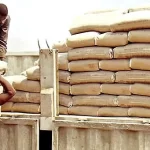Innovative strategies in the cement industry were spotlighted as Arvind Pathak[ez-toc], Group Managing Director of Dangote Cement Plc, emphasized the urgency of decarbonization at the 12th Africa Cement Trade Summit in Abidjan.
“The cement industry plays a pivotal role in infrastructure development but generates seven percent of global CO2 emissions,” Pathak said, urging a pivot to alternative fuels and sustainability reporting.
Join our WhatsApp ChannelHe highlighted the role of alternative fuels like municipal, agricultural, and industrial wastes in reducing emissions, citing their efficiency in CO2 reduction compared to fossil fuels.
Pathak emphasized that with cement consumption soaring globally and populations projected to grow, prioritizing alternative fuels was crucial to address climate change concerns. The focus shifted to Dangote Cement’s pioneering stance in decreasing CO2 emissions through a fuel substitution strategy.
READ ALSO: Nigeria, Germany Cement Economic Ties With $500 Million Renewable Energy Deal
The discussion widened to include the significance of managing waste in cement kilns and the potential for Africa to lead in waste generation, drawing attention to the need for sustainable waste management practices.
The narrative circled back to Pathak’s advocacy for a comprehensive approach to tackle emissions challenges, highlighting the potential of renewable energy, reforestation, and design optimization in cement production. Pathak urged a clear roadmap for decarbonization, stressing the importance of short-, medium-, and long-term targets. The article concluded with Dangote Cement’s commitment to sustainability reporting, showcasing a progression from a C rating to a B+ in climate change reporting, highlighting the company’s strides towards environmental responsibility.


















Follow Us